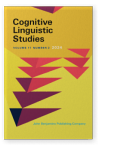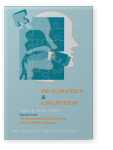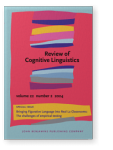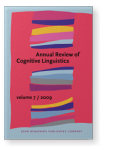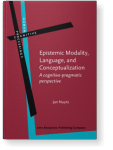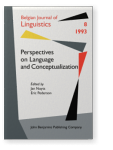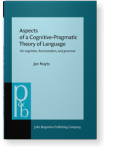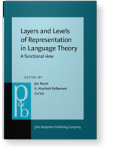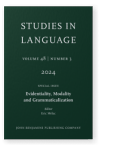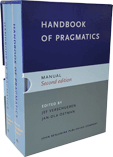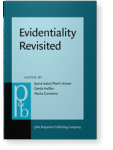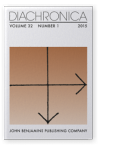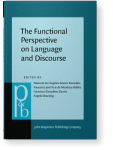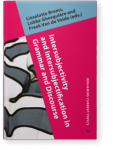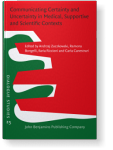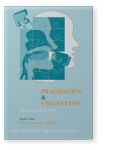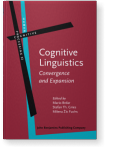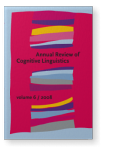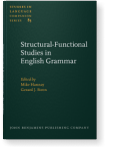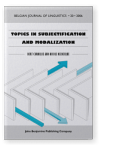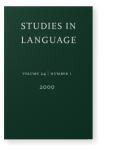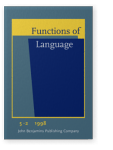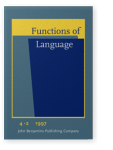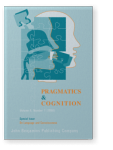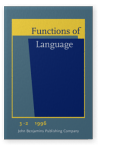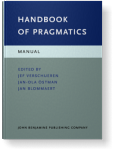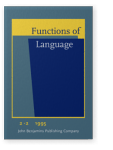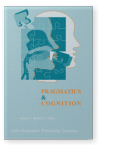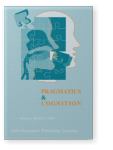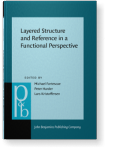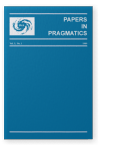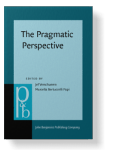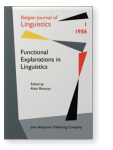Jan Nuyts
List of John Benjamins publications for which Jan Nuyts plays a role.
Journals
ISSN 0929-0907 | E-ISSN 1569-9943
ISSN 1877-9751 | E-ISSN 1877-976X
Yearbook
ISSN 1572-0268 | E-ISSN 1572-0276
Bibliography of Pragmatics Online
Edited by Frank Brisard, Michael Meeuwis and Jef Verschueren
[Online Resources Collection, BoP] 2003. Over 50.000 records
Subjects Bibliographies in linguistics | Electronic/Multimedia Products | Pragmatics
Epistemic Modality, Language, and Conceptualization: A cognitive-pragmatic perspective
Jan Nuyts
[Human Cognitive Processing, 5] 2001. xx, 428 pp.
Subjects Cognition and language | Cognitive psychology | Germanic linguistics | Pragmatics | Semantics
Perspectives on Language and Conceptualization
Edited by Jan Nuyts and Eric Pederson
[Belgian Journal of Linguistics, 8] 1993. 207 pp.
Subjects Cognition and language | Theoretical linguistics
Aspects of a Cognitive-Pragmatic Theory of Language: On cognition, functionalism, and grammar
Jan Nuyts
[Pragmatics & Beyond New Series, 20] 1992. xii, 399 pp.
Subjects Discourse studies | Functional linguistics | Generative linguistics | Pragmatics | Syntax | Theoretical linguistics
Layers and Levels of Representation in Language Theory: A functional view
Edited by Jan Nuyts, A. Machtelt Bolkestein and Co Vet
[Pragmatics & Beyond New Series, 13] 1990. xii, 348 pp.
Subjects Discourse studies | Functional linguistics | Pragmatics | Syntax
A Comprehensive Bibliography of Pragmatics
Compiled by Jan Nuyts and Jef Verschueren
[Not in series, 30] 1987. xi, 2197 pp. (4 vols)
Subjects Bibliographies in linguistics | Pragmatics
2024 On the link between grammaticalization and subjectification: The case of the Dutch modals Evidentiality, Modality and Grammaticalization, Mélac, Eric (ed.), pp. 608–637 | Article
This article argues that the widespread view that the diachronic processes of grammaticalization and of subjectification go hand in hand, and that highly subjectivized meanings typically correlate with highly grammaticalized forms, should be revised. The point is made on the basis of the case of… read more
2022 Functionalism vs. formalism Handbook of Pragmatics: Manual, Verschueren, Jef and Jan-Ola Östman (eds.), pp. 634–642 | Chapter
2022 Autonomous vs. non-autonomous syntax Handbook of Pragmatics: Manual, Verschueren, Jef and Jan-Ola Östman (eds.), pp. 112–117 | Chapter
2022 Mentalism Handbook of Pragmatics: Manual, Verschueren, Jef and Jan-Ola Östman (eds.), pp. 946–947 | Chapter
2017 Evidentiality reconsidered Evidentiality Revisited: Cognitive grammar, functional and discourse-pragmatic perspectives, Marín-Arrese, Juana I., Gerda Haßler and Marta Carretero (eds.), pp. 57–83 | Article
This article reconsiders the semantic status of the traditional concept of evidentiality, typically featuring ‘experientiality’ as the coding of directness of information, and ‘inferentiality’ and ‘hearsay’ as the marking of two different types of indirect information sources, as well as of two… read more
2015 Competing modals: Beyond (inter)subjectification Diachronica 32:1, pp. 34–68 | Article
This paper presents the results of a corpus-based diachronic investigation into the semantic evolution of the Dutch modals kunnen “can”, mogen “may” and moeten “must”, revealing an interaction between processes of (inter)subjectification and of semantic competition (‘no synonymy’). Mogen and kunnen… read more
2014 How did we think? The Functional Perspective on Language and Discourse: Applications and implications, Gómez González, María de los Ángeles, Francisco José Ruiz de Mendoza Ibáñez, Francisco Gonzálvez-García and Angela Downing (eds.), pp. 149–168 | Article
This paper presents a diachronic corpus investigation into the Dutch mental
state predicate denken ‘think’. It investigates both the semantic development
(specifically, the evolution in the non-attitudinal vs. the attitudinal meanings of
the verb) and the grammatical development (the evolution in… read more
2014 Notions of (inter)subjectivity Intersubjectivity and Intersubjectification in Grammar and Discourse: Theoretical and descriptive advances, Brems, Lieselotte, Lobke Ghesquière and Freek Van de Velde (eds.), pp. 53–76 | Article
This paper compares a few notions of ‘subjectivity’ (vs. ‘objectivity’ or ‘intersubjectivity’) circulating in the current functional and cognitive linguistic literature. It aims to demonstrate that, in spite of some points of contact in the analysis of certain linguistic issues, e.g. in the sphere… read more
2014 Subjectivity in modality, and beyond Communicating Certainty and Uncertainty in Medical, Supportive and Scientific Contexts, Zuczkowski, Andrzej, Ramona Bongelli, Ilaria Riccioni and Carla Canestrari (eds.), pp. 13–30 | Article
This conceptual paper reflects on the role of ‘subjectivity’ in the analysis of the semantic domain of modality. It offers a critical review of the traditional notions of subjectivity vs. objectivity (including Lyons’ 1977), and it elaborates further on an alternative notion, labeled… read more
2012 Notions of (inter)subjectivity Intersections of Intersubjectivity, Brems, Lieselotte, Lobke Ghesquière and Freek Van de Velde (eds.), pp. 53–76 | Article
This paper compares a few notions of ‘subjectivity’ (vs. ‘objectivity’ or ‘intersubjectivity’) circulating in the current functional and cognitive linguistic literature. It aims to demonstrate that, in spite of some points of contact in the analysis of certain linguistic issues, e.g. in the sphere… read more
2012 Language is an instrument for thought. Really? Culture – Language – Cognition, Dascal, Marcelo † (ed.), pp. 317–333 | Article
This discussion article addresses the assumption formulated in Dan Everett’s new book Language: The Cultural Tool that language is not only an instrument for communication, but also an instrument for thought. It argues that the latter assumption is far from obvious, and that, in any case, one… read more
2011 Pattern versus process concepts of grammar and mind: A cognitive-functional perspective Cognitive Linguistics: Convergence and Expansion, Brdar, Mario, Stefan Th. Gries and Milena Žic Fuchs (eds.), pp. 47–66 | Article
This chapter focuses on one element dividing cognitive linguistics and more traditional functional linguistic approaches to grammar, viz. the contrast between the construction oriented approach predominating in the former and the rule or process oriented approach prevailing in the latter. It offers… read more
2008 Qualificational meanings, illocutionary signals, and the cognitive planning of language use Annual Review of Cognitive Linguistics: Volume 6, Ruiz de Mendoza Ibáñez, Francisco José (ed.), pp. 185–207 | Article
This paper aims to show how a clear perspective on the cognitive systems and processes involved in language production can help to solve a number of persistent problems in the analysis of TAM and related categories, and particularly of the semantic categories of deontic modality, volition,… read more
2007 On certainly and zeker Structural-Functional Studies in English Grammar: In honour of Lachlan Mackenzie, Hannay, Mike and Gerard J. Steen (eds.), pp. 35–57 | Article
This contribution investigates the meanings and uses of the English and Dutch adverbs certainly and zeker. In the range of adverbial expressions of epistemic modality, the ‘strong’ adverbs (expressing ‘certainty’) clearly tend to be used in a much more ‘flexible’ way than the (relatively) weaker… read more
2006
On certainly and zeker
Topics in Subjectification and Modalization, Cornillie, Bert and Nicole Delbecque (eds.), pp. 45–72 | Article2002 Intentionality Handbook of Pragmatics: 2000 Installment, Verschueren, Jef, Jan-Ola Östman, Jan Blommaert † and Chris Bulcaen (eds.), pp. 1–17 | Article
2000 Tensions Between Discourse Structure and Conceptual Semantics: The Syntax of Epistemic Modal Expressions Studies in Language 24:1, pp. 103–135 | Article
Starting from an investigation of the information structure (specifically, the possibilities for focalization) of some major epistemic expression forms — modal adverbs and adjectives, mental state predicates, and modal auxiliaries — in Dutch and German (also with reference to English), this paper… read more
1998 Leo Hoye. Adverbs and Modality in English Functions of Language 5:2, pp. 279–280 | To be specified
1997 Gilles Fauconnier and Eve Sweetser (eds.) Spaces, Worlds, and Grammar Functions of Language 4:2, pp. 309–310 | To be specified
1996 Consciousness in language On Language and Consciousness, Jackendoff, Ray and Wallace Chafe, pp. 153–180 | Article
1996 Review of Bybee & Fleischman (1995): Modality in Grammar and Discourse Functions of Language 3:2, pp. 255–258 | Review
1995 Mentalism Handbook of Pragmatics: Manual, Verschueren, Jef, Jan-Ola Östman and Jan Blommaert † (eds.), pp. 366–367 | Article
1995 Review of Kahrel & Van den Berg (1994): Typological Studies in Negation Functions of Language 2:2, pp. 276–278 | Review
1995 Functionalism vs. formalism Handbook of Pragmatics: Manual, Verschueren, Jef, Jan-Ola Östman and Jan Blommaert † (eds.), pp. 293–300 | Article
1995 Afterthoughts to E. de Bustos's "On the very idea of cognitivism" Pragmatics & Cognition 3:2, pp. 281–284 | Discussion
1995 Autonomous vs. non-autonomous syntax Handbook of Pragmatics: Manual, Verschueren, Jef, Jan-Ola Östman and Jan Blommaert † (eds.), pp. 80–85 | Article
1994 The intentional and the socio-cultural in language use Pragmatics & Cognition 2:2, pp. 237–268 | Article
This paper is a contribution to the recent debate between a number of anthropologists and philosophers concerning the role of intentions in a theory of verbal behavior. It reviews a number of arguments put forward by ethno- and anthro-polinguists against the intention-centered view of human… read more
1993 Introduction Perspectives on Language and Conceptualization, Nuyts, Jan and Eric Pederson (eds.), pp. 7–8 | Miscellaneous
1992 Subjective vs. Objective Modality: What Is the Difference? Layered Structure and Reference in a Functional Perspective: Papers from the Functional Grammar Conference, Copenhagen, 1990, Fortescue, Michael, Peter Harder and Lars Kristoffersen (eds.), pp. 73–98 | Article
1990 Linguistic representation and conceptual knowledge representation Layers and Levels of Representation in Language Theory: A functional view, Nuyts, Jan, A. Machtelt Bolkestein and Co Vet (eds.), pp. 263–294 | Article
1989 On the functionality of language IPrA Papers in Pragmatics 3:1, pp. 88–128 | Article
1987 38. Pragmatics and cognition: On explaining language The Pragmatic Perspective: Selected papers from the 1985 International Pragmatics Conference, Verschueren, Jef and Marcella Bertuccelli Papi (eds.), pp. 715–732 | Chapter
1986 What Formalists Seem not to Understand About Functionalism: A Rejoinder to P. Miller Functional Explanations in Linguistics, Bossuyt, Alain (ed.), pp. 223–237 | Article
